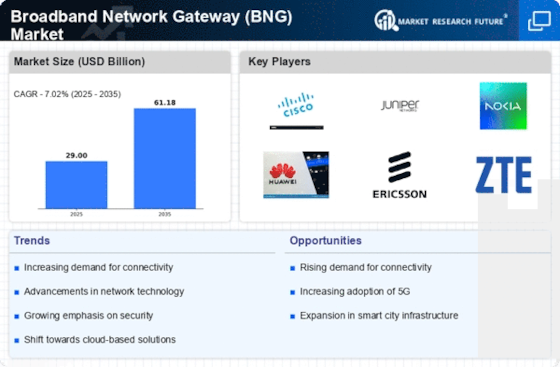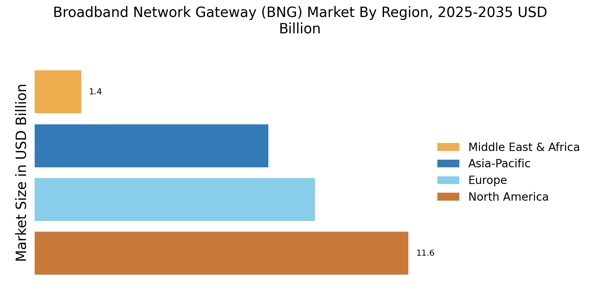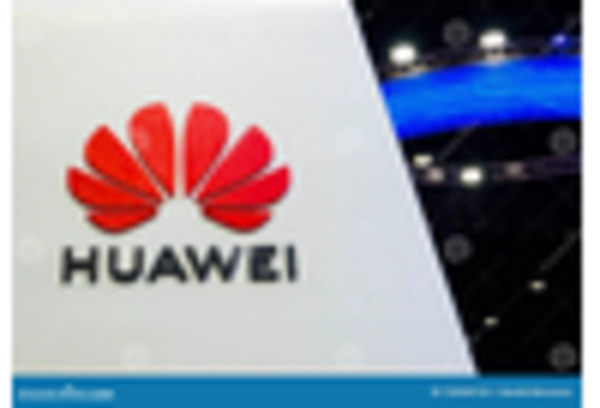Growth of Data Traffic
The Broadband Network Gateway Market (BNG) Market is significantly influenced by the exponential growth of data traffic. With the advent of streaming services, online gaming, and cloud computing, data consumption has skyrocketed. Reports indicate that global data traffic is expected to reach 4.8 zettabytes per year by 2025, necessitating advanced network solutions to manage this influx. BNGs play a crucial role in handling large volumes of data traffic efficiently, ensuring that users experience minimal latency and optimal performance. As service providers seek to enhance their network capabilities to accommodate this growth, the demand for BNGs is likely to increase. This trend underscores the importance of BNGs in the Broadband Network Gateway Market (BNG) Market, as they are essential for maintaining service quality amidst rising data demands.
Focus on Network Security
The Broadband Network Gateway Market (BNG) Market is increasingly driven by the focus on network security. As cyber threats become more sophisticated, service providers are prioritizing the implementation of robust security measures within their network infrastructure. BNGs are integral to this strategy, as they provide essential features such as user authentication, traffic filtering, and intrusion detection. The rising incidence of data breaches and cyberattacks has prompted organizations to invest in advanced security solutions, further propelling the demand for BNGs. According to industry reports, The Broadband Network Gateway Market (BNG) is projected to reach 345 billion dollars by 2026, highlighting the critical role of security in network management. This emphasis on security is likely to shape the future of the Broadband Network Gateway Market (BNG) Market.
Emergence of 5G Technology
The rollout of 5G technology is poised to transform the Broadband Network Gateway Market (BNG) Market. With its promise of ultra-fast speeds and low latency, 5G is expected to drive a new wave of connectivity solutions. As telecommunications companies invest heavily in 5G infrastructure, the demand for BNGs that can support this advanced technology is likely to rise. BNGs are essential for managing the increased number of connections and ensuring efficient data flow in 5G networks. Furthermore, the integration of BNGs with 5G technology can enhance user experiences by providing seamless connectivity for a multitude of devices. This convergence of technologies suggests a robust growth trajectory for the Broadband Network Gateway Market (BNG) Market as 5G adoption accelerates.
Increasing Internet Penetration
The Broadband Network Gateway Market (BNG) Market is experiencing a surge in demand due to the increasing internet penetration across various regions. As more households and businesses gain access to high-speed internet, the need for efficient network management solutions becomes paramount. According to recent data, internet penetration rates have reached approximately 60% in many regions, indicating a growing user base that requires robust connectivity solutions. This trend is likely to drive the adoption of BNGs, as they facilitate seamless connectivity and manage user traffic effectively. Furthermore, the proliferation of smart devices and IoT applications necessitates advanced network infrastructure, which BNGs are well-equipped to provide. Consequently, the increasing internet penetration is a significant driver for the Broadband Network Gateway Market (BNG) Market.
Rising Demand for Managed Services
The Broadband Network Gateway Market (BNG) Market is witnessing a rising demand for managed services as businesses seek to optimize their network operations. Organizations are increasingly outsourcing their network management to specialized service providers to enhance efficiency and reduce operational costs. This trend is particularly evident in sectors such as telecommunications and IT, where the complexity of network management can be overwhelming. Managed services that incorporate BNGs allow for better traffic management, improved security, and enhanced user experiences. As more companies recognize the benefits of outsourcing their network management, the demand for BNGs within managed service offerings is likely to grow. This shift towards managed services represents a significant opportunity for the Broadband Network Gateway Market (BNG) Market.

















